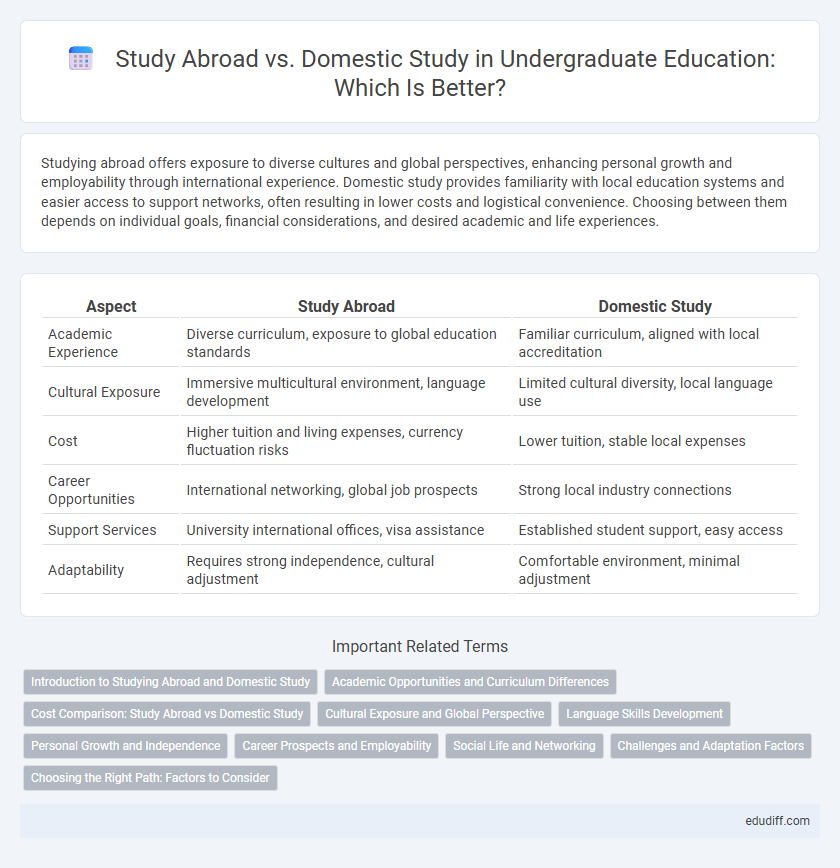Studying abroad offers exposure to diverse cultures and global perspectives, enhancing personal growth and employability through international experience. Domestic study provides familiarity with local education systems and easier access to support networks, often resulting in lower costs and logistical convenience. Choosing between them depends on individual goals, financial considerations, and desired academic and life experiences.
Table of Comparison
| Aspect | Study Abroad | Domestic Study |
|---|---|---|
| Academic Experience | Diverse curriculum, exposure to global education standards | Familiar curriculum, aligned with local accreditation |
| Cultural Exposure | Immersive multicultural environment, language development | Limited cultural diversity, local language use |
| Cost | Higher tuition and living expenses, currency fluctuation risks | Lower tuition, stable local expenses |
| Career Opportunities | International networking, global job prospects | Strong local industry connections |
| Support Services | University international offices, visa assistance | Established student support, easy access |
| Adaptability | Requires strong independence, cultural adjustment | Comfortable environment, minimal adjustment |
Introduction to Studying Abroad and Domestic Study
Studying abroad offers immersive language experiences and exposure to diverse cultures, enhancing global competence and independence. Domestic study provides familiarity with local education systems, easier access to support networks, and often lower costs. Both paths contribute uniquely to personal development and academic success, depending on individual goals and resources.
Academic Opportunities and Curriculum Differences
Study abroad programs offer exposure to diverse academic methodologies and specialized courses not typically available in domestic universities, enhancing global competence and cross-cultural understanding. Domestic study often provides a curriculum aligned with national education standards and easier access to internships or research opportunities within local industries. Differences in curriculum structure include variations in credit transfer policies, course content emphasis, and availability of language or region-specific studies.
Cost Comparison: Study Abroad vs Domestic Study
Studying abroad often incurs higher expenses due to international tuition fees, travel costs, and living expenses in foreign countries, which can sometimes be double or triple the cost of domestic study. Domestic study generally offers more affordable tuition rates, access to local scholarships, and lower living expenses, making it a budget-friendly option for many undergraduates. However, the total cost of studying abroad can vary widely depending on the country, university, and lifestyle choices, requiring careful financial planning and consideration of potential long-term benefits.
Cultural Exposure and Global Perspective
Study abroad programs offer unparalleled cultural exposure, enabling undergraduate students to immerse themselves in diverse traditions, languages, and social norms that enrich global awareness beyond classroom learning. Domestic study limits cultural interactions to familiar societal contexts, providing depth in national cultural understanding but less opportunity for international perspective development. Engaging in study abroad cultivates adaptability, cross-cultural communication skills, and a comprehensive worldview crucial for global career readiness.
Language Skills Development
Studying abroad significantly enhances language skills through full immersion in the target language environment, promoting fluency and practical communication abilities. Domestic study often offers structured language courses but lacks the cultural and conversational exposure found overseas. Immersive experiences abroad improve pronunciation, vocabulary retention, and cross-cultural understanding essential for global competence.
Personal Growth and Independence
Studying abroad enhances personal growth by immersing students in diverse cultures, fostering independence through adapting to unfamiliar environments and managing daily life without familiar support systems. Domestic study offers a more comfortable setting where students can gradually build independence while maintaining close ties to family and local networks. Both options develop crucial life skills, but international study often accelerates maturity and global awareness.
Career Prospects and Employability
Study abroad programs enhance career prospects by providing international experience, cross-cultural communication skills, and global networks that domestic study often lacks. Employers highly value adaptability and global awareness, making graduates with overseas education more competitive in the job market. Domestic study offers strong local industry connections and internships, which can directly align with regional job opportunities and professional development.
Social Life and Networking
Studying abroad offers unparalleled opportunities to build a global network and immerse in diverse social cultures, enhancing interpersonal skills and cross-cultural communication. Domestic study often provides a closer-knit community with easier access to family and familiar social norms, fostering strong local connections and support systems. Both options significantly impact social life and networking, but studying abroad uniquely broadens perspectives and international career prospects.
Challenges and Adaptation Factors
Study abroad poses challenges such as cultural shock, language barriers, and homesickness, requiring strong adaptability and resilience from students. Domestic study offers familiarity with environment, social norms, and academic systems, easing the transition but potentially limiting exposure to diverse perspectives. Key adaptation factors include building support networks, developing intercultural communication skills, and managing academic expectations effectively.
Choosing the Right Path: Factors to Consider
Evaluating study abroad versus domestic study involves analyzing academic goals, cultural adaptability, and budget constraints to determine the optimal educational experience. Access to global networks and language immersion benefits study abroad, while domestic study offers established support systems and familiarity with local job markets. Personal career aspirations, financial resources, and readiness for cultural challenges are critical factors influencing the right path choice.
Study Abroad vs Domestic Study Infographic

 edudiff.com
edudiff.com